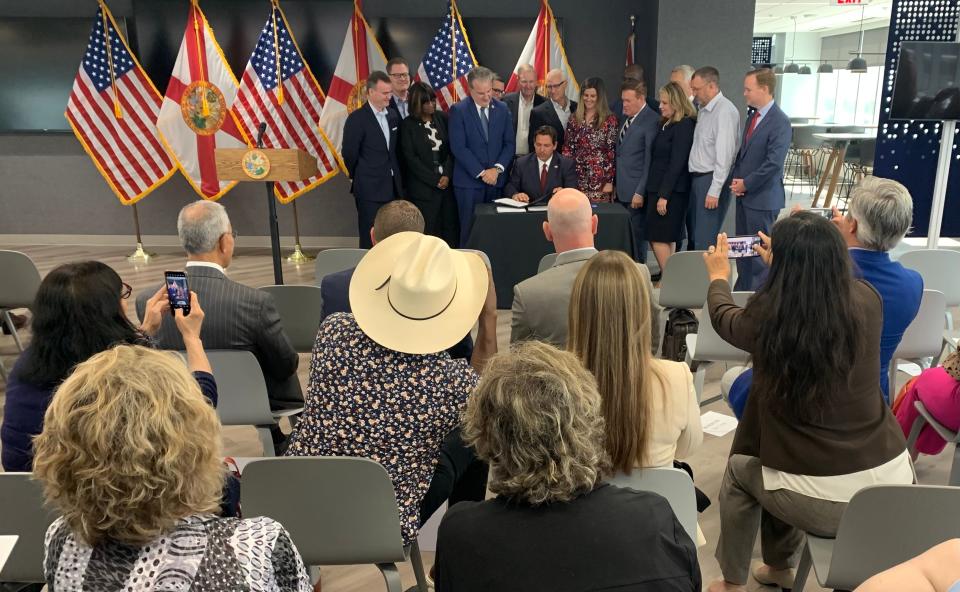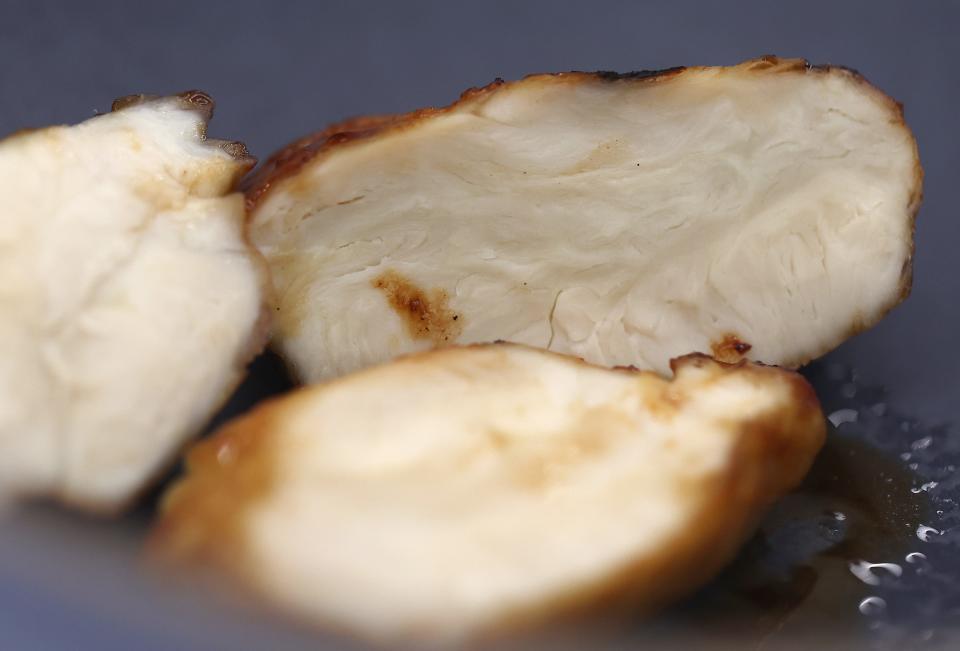DeSantis panders to ranchers with Florida's lab-grown meat ban. It's bad economics.
Last week was a bad one for libertarianism.
Actually, it’s been a bad decade for libertarianism. “No, it’s been a bad century,” a devout libertarian might counter, accurately enough.
Still, things seem to be going especially badly when the Libertarian Party excitedly announces as a guest speaker at its upcoming convention a guy who relishes tariffs, resents immigration and has taken to chattering lately about deploying the U.S. military domestically if he’s elected president again.
The Libertarian Party has often been a poor servant to thoughtful libertarianism. It’s always had trouble resisting the temptation to ally itself with candidates who aren’t very libertarian in practice in hopes of gaining a wider audience. It’s also always had a major kook problem, one that’s gotten worse over the last few years as alt-righters have gained influence within the organization. Inviting Donald Trump to the convention feels like the culmination of both trends simultaneously.
That wasn’t the worst moment for libertarianism last week, though.
DeSantis' ban on lab-grown meat is solution in search of a problem
The worst moment came on Wednesday when the second-most popular populist in the GOP made an exciting announcement of his own. No more will the scourge of meat grown in labs trouble the Sunshine State, Gov. Ron DeSantis declared. Henceforth, producing or selling the stuff is an honest-to-goodness crime punishable by up to 60 days in jail.
If you want to make a living peddling meat in Florida, you had better be hacking off pieces of a cow, pig or chicken. Which made it not just a grim week for libertarians in the GOP but an unusually grim one for animals as well.
RFK Jr. can't win. But he and Cornel West could put Trump back in the White House.
I often write about the excesses of populism and that’s what Florida’s new law demonstrates, in spades. With unusual efficiency, it combines the most loathsome elements of the sort of New Right politics that DeSantis has embraced to get ahead in his party. It’s imperious, protectionist, deeply corrupt and panders to the paranoia that animates so much of the GOP’s crankish base.
Amid the crimes, coup attempts and general amorality, it’s a nice reminder that populism is terrible for mundane policy reasons as well.
Every conservative will have the same intuition about Florida’s dumb law. If there are people willing to try lab-grown meat (and there assuredly are) and there are people willing to sell it to them, by what right does the government interfere in that transaction?
In the “free state of Florida,” why shouldn’t residents be free to participate in a market for “fake meat”?

The only good answer I can think of would involve safety concerns with the product. But there aren’t any. Even if there were, those concerns might plausibly be addressed by regulating production rather than criminalizing it.
Nor is DeSantis seriously arguing that lab-grown meat poses a grave public health risk: How could he when just two companies have received Food and Drug Administration approval to produce the stuff, and neither one has stock available for purchase anywhere in the United States?
Florida’s law is a solution in search of a problem, as bad legislation often is.
DeSantis embraces government paternalism
The pre-Trump "Tea Party" version of DeSantis would agree with all of that emphatically, I suspect. The post-Trump populist version not only sees no problem with state paternalism in this matter, he reveled in it with authoritarian bombast at Wednesday’s news conference.
"Take your fake lab-grown meat elsewhere. We're not doing that in the state of Florida," the governor crowed at one point. At another, he compared eating the meat to eating insects and sneered that “Florida has heard enough on that."
Individual Floridians could decide for themselves whether they’ve “heard enough.” Why does DeSantis Augustus feel obliged to decide for them?
This episode reveals an ideological fault line between the two factions of the right. Conservatives believe that the government should override individual agency when a compelling public interest requires it to do so. Populists seem to believe that advancing a right-wing cultural agenda is always a compelling interest − even in cases like this one where the specific interest in question is anything but compelling.
Needless to say, that populist license to behave imperiously runs only one way. If President Joe Biden signed a law passed by a Democratic Congress banning meat and declared that “we” Americans have “heard enough” about eating animals, the New Right’s indignation at his contempt for individual agency would erupt like Krakatoa.
DeSantis’ own remarks illustrate the point. Compare his disdain for the fact that the World Economic Forum recommends eating insects to reduce carbon emissions with his obliviousness to his own petty authoritarianism in banning lab-grown meat. At least the WEF is offering you a choice. In Florida, the governor chooses for you.
It would be bad enough if the “fake meat” ban were merely pointless and authoritarian, but it’s also terrible economic policy. It will be terrible for Florida and it might be terrible for America, depending on how many other red states are foolish enough to follow DeSantis’ lead. But it’s terrible any way you slice it.

The worst-case scenario is that other Republicans emulate Florida and start banning the production and sale of “fake meat” in their own backyards.
“This bill sends a terrible message to the investors, scientists, and entrepreneurs that have built America’s global leadership in alternative proteins,” one executive at a company producing lab-grown meat told Green Queen, a website focusing on decarbonizing food systems.
The fact that the United States isn’t aggressively producing cultivated meat won’t stop global competitors like China from doing so, and so jobs and dollars will flow there instead.
Eventually, we’ll either be dependent on imports to meet domestic demand, or U.S. legislative efforts to choke off the global supply will succeed well enough to kill a promising industry in its crib. Thank Ron DeSantis and the Florida Legislature if it happens: The “free state of Florida,” forever boasting of its dynamism, will have led the way.
But wait. It gets worse.
Florida's 'fake meat' ban is really a Big Ag play
Florida’s “fake meat” ban is actually a grotesquely brazen case of rent-seeking lightly disguised in culture-war trappings to make it more palatable to populist suckers.
There’s nothing more high-minded behind the ban than shielding the state’s 15,000 cattle ranchers from competitive pressure, and DeSantis’ administration isn’t straining to pretend otherwise.
“We must protect our incredible farmers and the integrity of American agriculture,” Florida’s agriculture commissioner said in a news release. “Lab-grown meat is a disgraceful attempt to undermine our proud traditions and prosperity, and is in direct opposition to authentic agriculture.”
The governor himself was explicit about the ban’s protectionist intentions. “What we’re protecting here is the (cattle) industry against acts of man, against an ideological agenda that wants to finger agriculture as the problem, that views things like raising cattle as destroying our climate,” DeSantis said at his news conference, reminding the audience that Florida has “one of the top cattle industries in the country.”
Exactly why that industry should be “protected” from a competitor that potentially might produce more jobs, more wealth, fewer hungry people and a better environment is unclear except for the fact that Big Ag has vastly more money and political influence than the nascent “fake meat” industry does.
To grasp how grim the state of the GOP is under the leadership of Donald Trump and Ron DeSantis, meditate on the fact that the following quote came from a Democrat rather than a Republican: “I don’t think the state of Florida should be choosing winners and losers and allow corporate capture to take place, where we’re basically bending laws to benefit specific industries,” state Rep. Anna Eskamani said in March about banning lab-grown meat.
Opinion alerts: Get columns from your favorite columnists + expert analysis on top issues, delivered straight to your device through the USA TODAY app. Don't have the app? Download it for free from your app store.
Still, even a politician as popular and powerful as DeSantis will struggle to sell a policy to his base if he can’t find a justification more stirring than “I’ve been bought and sold by a special interest.”
Trump understands that, too, per his recent flip-flop on banning TikTok. He claimed that his newfound opposition to the ban is a matter of not wanting the dastardly Big Tech progressives at Facebook to benefit from having one of their chief competitors go dark in America, but the likely truth about his reversal is far more mundane. Culture war is a wonderful fig leaf for financial motives. Ask any populist demagogue with a presence online.
DeSantis' bad judgment would make him a bad president
I confess to being biased about all of this.
Not in the sense that I dislike DeSantis and his brand of politics, although I do. And not in the sense that I love animals and would greatly prefer to see fewer of them killed for my dinner, although that’s also true.
I’m biased because I live in Texas. And increasingly, novel-ish technologies that were traditionally championed by the left and scoffed at by the right are keeping me and other Texans alive.
Hate Texas? Get over it. Why so many people are moving to the Lone Star State.
If the power grid in this state ever goes down during one of our infernal summers, many people will die. The heat is indescribable, routinely above 100 degrees for months on end. And with Americans moving here in droves every year, the odds of that grid failure happening are theoretically rising. More people means more demand for electricity means more stress on the grid.
But it hasn’t happened yet. And the reason it hasn’t happened is because green energy − wind and solar − is meeting the rising demand and then some.
Texas, America’s paradigmatic red state, is now one of the country’s most robust producers of wind and solar energy. That surge in production kept the grid stable last summer as the state melted under relentless heat and power demand reached record levels.
If Republican lawmakers in Texas had treated green energy the way DeSantis is treating “fake meat,” demagoguing it on populist grounds as some sort of hippie cultural affront to “tradition” or whatever, the state would be unlivable for months each year. Because they didn’t, Texas is a powerhouse − in every sense.
Lab-grown meat won’t change lives that dramatically anytime soon, but every useful technology begins as a fledgling. The governor of Florida would rather smother the latest one for political advantage than give it space to compete.
That’s the sort of bad judgment that would make him a bad president, and should be held against him − along with numerous other things − when he runs again in 2028. Conservatives can do better.
Nick Catoggio writes the Boiling Frogs newsletter for The Dispatch, where this column first appeared.
You can read diverse opinions from our Board of Contributors and other writers on the Opinion front page, on Twitter @usatodayopinion and in our daily Opinion newsletter.
This article originally appeared on USA TODAY: DeSantis bans lab grown meat in Florida. And abandons small government


